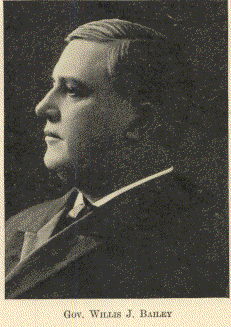| 1918 KANSAS AND KANSANS | Chapter 62 | Part 1 |
CHAPTER LXII
WILLIS J. BAILEY

[Copy by Willard of Portrait in Library of Kansas State Historical Society]
Willis J. Bailey, was born in Carroll County, Ill., October 12, 1854. He received his education in the common schools, at Mount Carroll High School, and at the University of Illinois. He graduated from this latter institution in 1879. His intention had been to study law, but his life as a Kansas farmer never gave him the necessary time. However, his alma mater conferred the degree of LL. D. on him in 1904. In 1879, Mr. Bailey came to Kansas in company with his father. They located in Nemaha County.
Mr. Bailey saw the richness of the soil, and the vast opportunities the future held for Kansas land. So he resolved to possess as much of it as possible. He first bought eight hundred acres, to which he has since added much. The land increased in value with marvelous rapidity, and this, together with stock-raising, made him one of the wealthy men of Kansas. The town of Baileyville was founded on a corner of the Bailey farm, and the surrounding country became thickly settled. Large rich farms in a fine state of cultivation mark that portion of the country.
Mr. Bailey is an earnest Republican. In 1888 he was elected to the Legislature, and in 1890 he was re-elected. He was President of the Republican State League in 1893, but was defeated as the Republican candidate for Congress from the First District, in 1896. In June, 1898, he was nominated for Congressman-at-large by the Republican State Convention at Hutchinson, and elected. At the end of his term he went back to the farm, where he remained until he was nominated for Governor of Kansas, in 1902. He was elected, and began his term in January, 1903.
It was urged against him in the campaign, both in jest and seriously, that he was unmarried. But this cause of criticism he soon removed. While Governor, he married Mrs. Ida B. Weed.
The Legislature of 1903 elected Chester I. Long United States Senator. Acts were passed providing for tuition fees at State Institutions, continuing the bounty on sugar beets, prohibiting the use of the slot-machine as a gambling device, placing suburban electric railways under control of the Board of Railroad Commissioners, appropriating $100,000 for the Louisiana Exposition, and other important acts.
Heavy floods in the spring of 1903 did much damage to Kansas. The greatest losses were sustained at Topeka, Lawrence, and Kansas City. Much property was destroyed, and many people were drowned. So serious was the situation that Governor Bailey called a special session of the Legislature to deal with it. Attempts to make direct appropriations for the relief of the flood sufferers failed, but means enabling them to help themselves were found. And $33,000 was raised for their relief by Kansas people.
In the second year of Governor Bailey's term, Joseph R. Burton, United States Senator from Kansas was tried on a bribery charge and convicted. He was sentenced to a fine of $2,500 and six months' imprisonment. Many people believed his prosecution malicious, and that he had not violated any law, either moral or statutory.
In 1904, Kansas towns again suffered from floods, though not so severely as in the previous year.
Beginning Monday, May 30, 1904, a three-days' celebration of the Semi-Centennial Anniversary of the organization of the Kansas Territory under the Kansas-Nebraska Act was held at Topeka.
Kansas was well represented at the Louisiana Purchase Exposition, and "Kansas Day" there was fittingly celebrated.
The State Capitol of Kansas was finally completed in 1903. It had been thirty-three years in building.
At the close of his term as Governor, Mr. Bailey removed to Atchison, and in 1907 became vice president and manager of the Exchange National Bank of that city.
Though often urged to become a candidate for high offices by the Republican party, since his retirement, Mr. Bailey has never been active in the political field. He was elected a director of the Kansas City Federal Reserve Bank in July, 1914.
| 1918 Kansas and Kansans | Previous Section | Next Section |
A Standard History of Kansas and Kansans , written and compiled by William E. Connelley, transcribed by Carolyn Ward, 1998.
